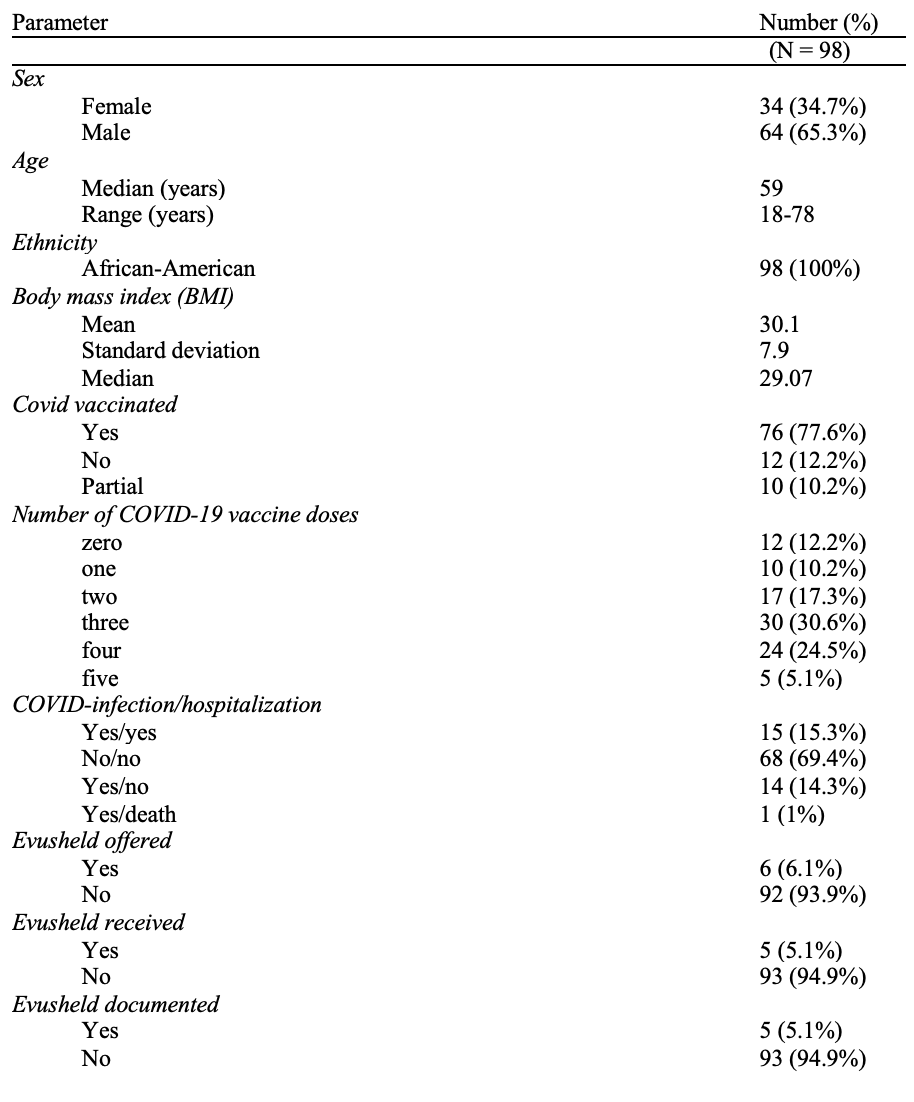Monday Poster Session
Category: Infections and Microbiome
P3426 - Retrospective Study Assessing Acceptance of Tixagevimab and Cilgavimab (Evusheld) Among Immunocompromised Patients
Monday, October 27, 2025
10:30 AM - 4:00 PM PDT
Location: Exhibit Hall

Marko Kozyk, MD (he/him/his)
Corewell Health William Beaumont University Hospital
Royal Oak, MI
Presenting Author(s)
Marko Kozyk, MD, Kateryna Strubchevska, MD, Carl B. Lauter, MD
Corewell Health William Beaumont University Hospital, Royal Oak, MI
Introduction: Immunocompromised patients are more likely to have an inadequate antibody response to Covid-19 vaccination and severe infection requiring hospitalization. On December 8, 2021, the U.S. Food and Drug Administration issued an Emergency Use Authorization to make Tixagevimab and Cilgavimab (Evusheld) available for pre-exposure prophylaxis of Covid-19. We aimed to assess the number of qualified patients who received Evusheld after clinic visits or in-hospital consults with the gastroenterologists, and administration was documented in the chart.
Methods: A retrospective chart review study of high-risk patients for Covid-19 who had been evaluated by a gastroenterologist between December 8, 2021 and January 26, 2023 was reviewed. Inclusion criteria were the following: received a solid-organ transplant within 1 year, used biologic agents, immunosuppressive medications, or high-dose corticosteroids (i.e., ≥20 mg prednisone or equivalent per day when administered for ≥2 weeks). The primary objective was to assess the number of patients satisfying inclusion criteria who were offered Evusheld.
Results: 98 patients satisfied the inclusion criteria. There were 34 female and 64 male patients in the study (Table 1). 23 patients had underlying alcoholic cirrhosis, 23 patients had autoimmune hepatitis, 24 patients had ulcerative colitis, 4 patients had Crohn’s disease, 2 patients had alcoholic hepatitis, 7 patients had a history of liver transplant, 4 patients had combined liver and kidney transplantation, 5 patients had human immunodeficiency virus, 3 patients had primary sclerosing cholangitis, 2 patients had primary biliary cirrhosis, and 1 patient had neuroendocrine tumor of the pancreas. 39 patients received two or less doses of Covid-19 vaccine. The mean body mass index was 30.1, which highlights a high-risk group of patients. 92 patients were not offered Evusheld. Only 6 patients were offered Evusheld, 5 patients received Evusheld, and administration was documented in the chart.
Discussion: We were disappointed to find how few qualified patients were offered and received Evusheld. Possible barriers included lack of physician education, or a lack of confidence in using Evusheld, leading to underutilization of effective and potentially life-saving treatment. Evusheld recently lost its authorization due to resistance of the new Covid-19 Omicron variants to Evusheld. We consider our study important as we identified evidence of strong underutilization of a potentially life-saving treatment.

Figure: Table 1. Baseline Characteristics.
Disclosures:
Marko Kozyk indicated no relevant financial relationships.
Kateryna Strubchevska indicated no relevant financial relationships.
Carl Lauter indicated no relevant financial relationships.
Marko Kozyk, MD, Kateryna Strubchevska, MD, Carl B. Lauter, MD. P3426 - Retrospective Study Assessing Acceptance of Tixagevimab and Cilgavimab (Evusheld) Among Immunocompromised Patients, ACG 2025 Annual Scientific Meeting Abstracts. Phoenix, AZ: American College of Gastroenterology.
Corewell Health William Beaumont University Hospital, Royal Oak, MI
Introduction: Immunocompromised patients are more likely to have an inadequate antibody response to Covid-19 vaccination and severe infection requiring hospitalization. On December 8, 2021, the U.S. Food and Drug Administration issued an Emergency Use Authorization to make Tixagevimab and Cilgavimab (Evusheld) available for pre-exposure prophylaxis of Covid-19. We aimed to assess the number of qualified patients who received Evusheld after clinic visits or in-hospital consults with the gastroenterologists, and administration was documented in the chart.
Methods: A retrospective chart review study of high-risk patients for Covid-19 who had been evaluated by a gastroenterologist between December 8, 2021 and January 26, 2023 was reviewed. Inclusion criteria were the following: received a solid-organ transplant within 1 year, used biologic agents, immunosuppressive medications, or high-dose corticosteroids (i.e., ≥20 mg prednisone or equivalent per day when administered for ≥2 weeks). The primary objective was to assess the number of patients satisfying inclusion criteria who were offered Evusheld.
Results: 98 patients satisfied the inclusion criteria. There were 34 female and 64 male patients in the study (Table 1). 23 patients had underlying alcoholic cirrhosis, 23 patients had autoimmune hepatitis, 24 patients had ulcerative colitis, 4 patients had Crohn’s disease, 2 patients had alcoholic hepatitis, 7 patients had a history of liver transplant, 4 patients had combined liver and kidney transplantation, 5 patients had human immunodeficiency virus, 3 patients had primary sclerosing cholangitis, 2 patients had primary biliary cirrhosis, and 1 patient had neuroendocrine tumor of the pancreas. 39 patients received two or less doses of Covid-19 vaccine. The mean body mass index was 30.1, which highlights a high-risk group of patients. 92 patients were not offered Evusheld. Only 6 patients were offered Evusheld, 5 patients received Evusheld, and administration was documented in the chart.
Discussion: We were disappointed to find how few qualified patients were offered and received Evusheld. Possible barriers included lack of physician education, or a lack of confidence in using Evusheld, leading to underutilization of effective and potentially life-saving treatment. Evusheld recently lost its authorization due to resistance of the new Covid-19 Omicron variants to Evusheld. We consider our study important as we identified evidence of strong underutilization of a potentially life-saving treatment.

Figure: Table 1. Baseline Characteristics.
Disclosures:
Marko Kozyk indicated no relevant financial relationships.
Kateryna Strubchevska indicated no relevant financial relationships.
Carl Lauter indicated no relevant financial relationships.
Marko Kozyk, MD, Kateryna Strubchevska, MD, Carl B. Lauter, MD. P3426 - Retrospective Study Assessing Acceptance of Tixagevimab and Cilgavimab (Evusheld) Among Immunocompromised Patients, ACG 2025 Annual Scientific Meeting Abstracts. Phoenix, AZ: American College of Gastroenterology.
